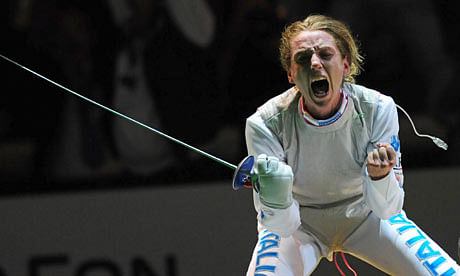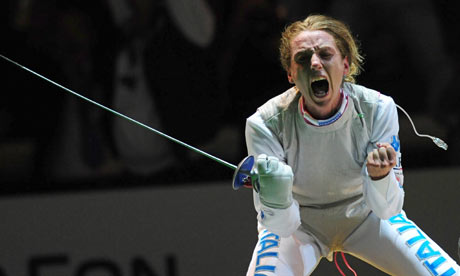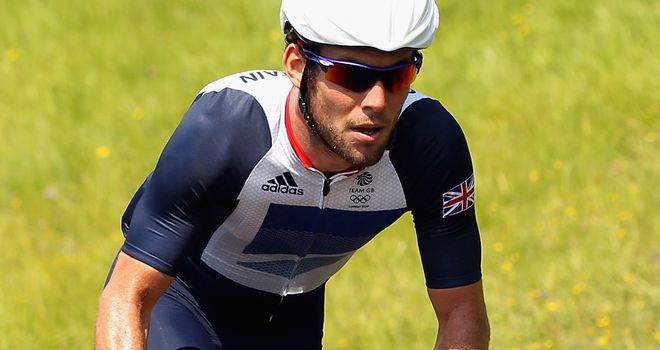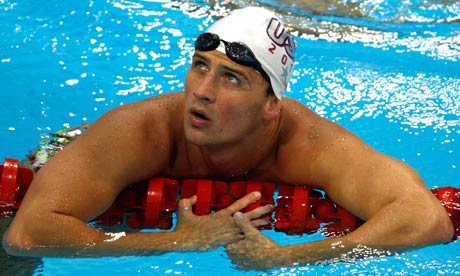
Olympic Theatre - Defying the script in the very first act
The action may be just beginning to heat up, but the enduring spirit of the games is already soaking both the athletes and the audience in its undulating waves of glory and heartbreak. We are only into the fourth day of action, but already there have been moments of great agony and ecstatic joy that capture the essence of this roller coaster ride. It is another matter that the journey often involves years of meticulous preparation for a ride that could be over in the passing of a few fleeting moments.

Valentina Vezzali, the great Italian fencer who has won gold three times in a row since Sydney, had her hopes for a fourth consecutive Gold crushed by her countrywoman Arianna Errigo. Left to scavenge for bronze against the world No.1 Nam Hyun-Hee, also an upset victim to another Italian, Vezzali was trailing 8-12 with barely a minute left on the clock.
With the Korean looking like a lock for the medal, the Italian launched into a bout of aggressive attack that first shocked her opponent before completely numbing her into meek submission in the final seconds. In an amazing turnaround, Vezzali had somehow scripted a comeback to force the extra minute of death by the first strike after tying 12-12 in regulation time.
The Korean was mauled in the mind by then, and it did not take long for Vezzali to make that strike and snatch a bronze medal from literally the jaws of defeat. In a few fleeting moments of inspired brilliance, Vezzali made up for the utter disappointment of missing the finals with a gutsy fight to salvage a medal.
The performance of the 38 year old veteran was a memorable advertisement for the value of a medal at the Olympics, irrespective of its colour. “It was such a tough battle for the bronze medal, but in the end I managed to get it, although my goal was of course to get my fourth gold in a row,” said an emotionally drained Vezzali, on the verge of some more tears. “I wanted to win that fourth gold so badly.”
In stark contrast lies the story of the British cycling team that included the Tour de France champion Bradley Wiggins and Mark Cavendish, the man that worked tirelessly to assist Wiggins to become the first Englishman to win the gruelling competition. It also had in its ranks the TDF runner-up Chris Froome, time-trial exponent David Millar and Ian Stannard.

British hopes were riding high and the dream team looked set to mine some metal at the end of the 250km road race. Wiggins was intensely keen on paying back Cavendish for his efforts in aiding his campaign in Paris. But as it is often said, even the best laid plans can go awfully wrong. And so they did for this crack team of cyclists who were left to work for themselves for much of the race.
Wiggins and company worked their pedals off for much of the race as they sought to prime Cavendish for the finish. Unfortunately for them, the lack of support from the other teams in the peloton enabled a 33 rider breakaway to take centre stage and get away with it in the end. Kazakh rider Alexandr Vinokurov took the honours, but the hearts of the British lay shattered at the end of the gruelling race that left them empty-handed and broken.
And then, who can forget the men’s 400m individual medley. Touted as a race between Ryan Lochte and Michael Phelps, the final turned up a most unexpected result. Of course, there was a hint of what may transpire when Phelps barely made it to the final after he brought up the tail after qualifying last for the much-awaited showdown.

Unfortunately for the 16-time winner who is used to be in the middle of the pool, life in lane 8 proved to be tougher than he imagined. In a race that was dominated by Lochte, who won by almost three body lengths, Phelps lost his mojo completely in the final 100m to finish out of the medals for the first time since Sydney.
Meanwhile, for the Indians, the disappointment of a tough loss for the women’s archery team overshadowed promising performances from Saina Nehwal, Parupalli Kashyap, Vijender Singh and Jai Bhagawan, who won their first outings at this year’s Olympics. But then the Olympics are just as much about performance as they are about the heroic stories of athletes whose spirit betrays belief.
That brings us to a celebration of the life of Natalia Partyka, a Polish table tennis player who was born without her right forearm. The 23-year-old who celebrated her birthday during the opening ceremony on Friday, fought a grim battle against Li Jie of the Netherlands.

One needs to watch the young woman cradle the ball at the edge of her right elbow before gently tossing it up for her serve to be reminded of the power of positive spirit. Jie herself fought back from two games down, but it barely mattered that Partyka lost 13-11, 11-6, 14-16, 7-11, 10-12, 7-11. The fact that the woman stood at the table with her head held high is a glorious triumph for human spirit. And that is all one can ask for from the Olympics.